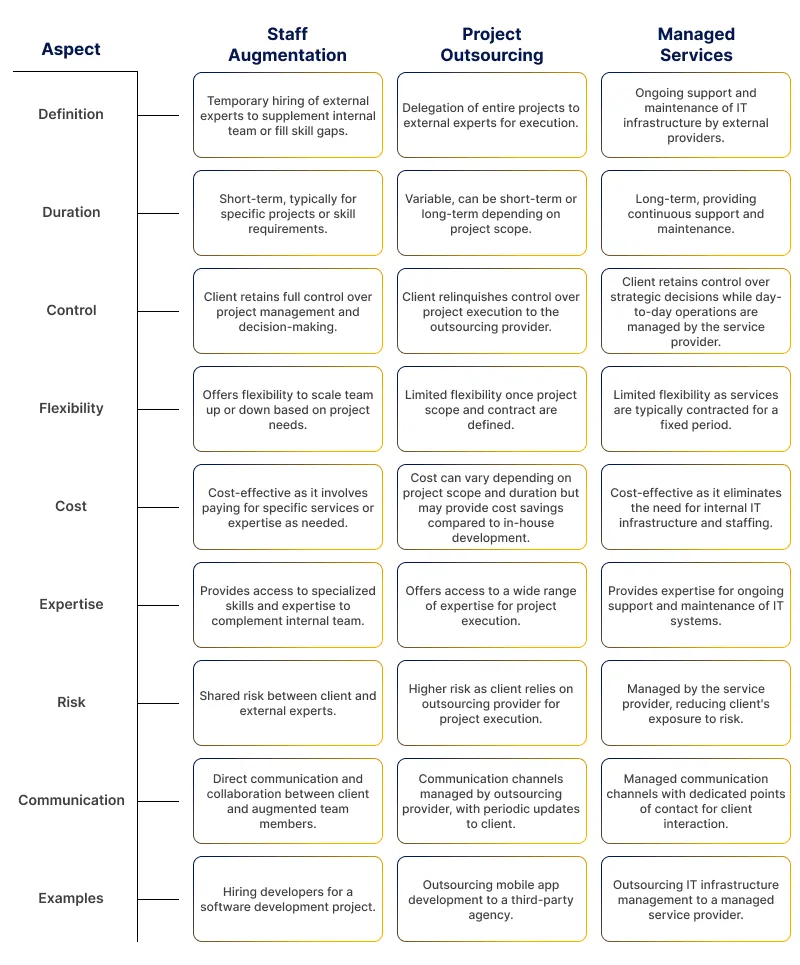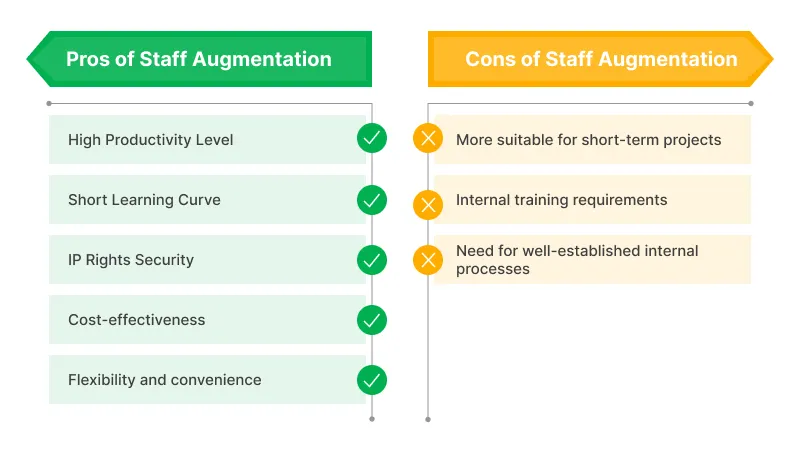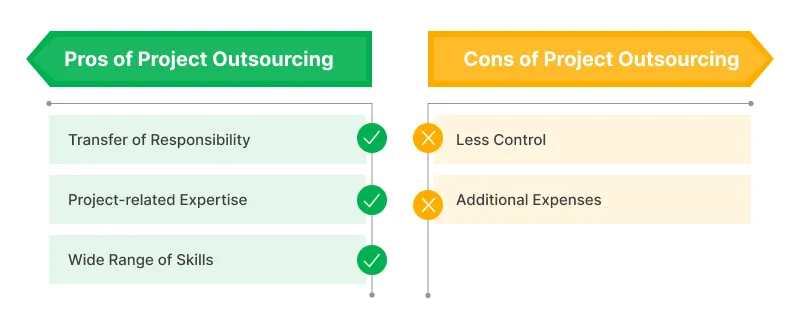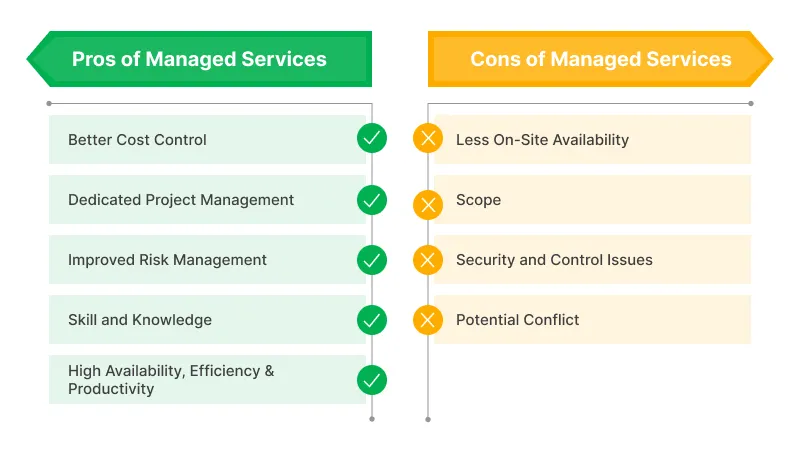Having the right talent on your team is the most important to build a competitive solution that can meet customer needs.
Did you know? According to grandviewresearch, the global IT services outsourcing market, valued at USD 639.59 billion in 2022, is expected to grow at a CAGR of 8.0% from 2023 to 2030.
This above statistics shows that IT outsourcing services are growing, with businesses looking for an opportunity to grab the best talent available at a reasonable price.
When you start looking to outsource your development needs, you might face the challenge of understanding which one is the ideal option based on your particular project requirements.
You usually have three options to consider: staff augmentation vs managed services vs project outsourcing.
Let’s discuss each in detail one by one and understand their pros and cons for a deeper understanding to help you take the final decision.
Staff Augmentation
Staff augmentation is an outsourcing model where businesses hire external personnel temporarily to boost their team’s capacity. This can involve onshore, nearshore, or offshore talent, allowing for scalable team adjustments based on demand.
Utilize our pool of skilled professionals to enhance your team's capabilities and achieve project success.
In IT, staff augmentation can be used for programming, quality assurance, workflow optimization, and quality control.
It helps address roadblocks, fill skill gaps, meet budget and time constraints, fix bugs, and speed up product launches.
This approach is cost-effective and flexible, providing a temporary solution that uses your existing team and resources while reducing operating costs.
Pros of Staff Augmentation
Staff augmentation is a strategic outsourcing model that allows companies to temporarily hire external experts to bolster their existing teams. This approach provides several benefits that can significantly enhance a business’s efficiency and effectiveness.
1. High Productivity Level
The high productivity level of IT staff augmentation is a significant reason for considering this option.
When you bring in an outside team of experts, they are already up to speed on the latest technologies and best practices.
Moreover, they can hit the ground running and help your team achieve their goals quickly.
2. Short Learning Curve
The IT Staff Augmentation companies’ team is already familiar with your business, the projects they’re working on, and the implementation standards.
They can quickly speed up specific challenges you are facing and help address technical problems quickly. It reduces your learning curve and lets you start achieving the results you want more quickly.
3. IP Rights Security
With IT staff augmentation, the external team is responsible for its intellectual property (IP). This ensures that your critical business data stays safe at all times.
You’ll no longer have to worry about the security of your IP when you approach IT staff augmentation services. Moreover, you can analyze that while choosing staff augmentation vs. managed services, staff augmentation is a better choice
4. Cost-effectiveness
IT staff augmentation is a very cost-effective option. When you bring in an outside team of experts, you only pay for the services you need.
While hiring full-time employees, you don’t need to worry about salaries, benefits, office space expenses, and other overhead costs.
5. Flexibility and convenience
IT staff augmentation lets you quickly scale your team up or down as needed. You don’t need to bother hiring and training new employees when projects ramp up, and you don’t risk losing productivity if one of your people leaves the company.
This flexibility and convenience help ensure that your workforce is always ready to meet the demands of your business. You can comprehend while choosing that staff augmentation would be a better option.
Overall, staff augmentation provides a flexible and cost-effective solution to meet dynamic business needs, ensuring that you can maintain high productivity and security standards.
Also read: Top 21 IT Staff Augmentation Service Companies In 2024
Cons of Staff Augmentation
Staff augmentation is a flexible and efficient method of enhancing your team with external expertise. It offers numerous advantages, but it’s important to consider some potential drawbacks as well.
1. More suitable for short-term projects
Staff augmentation is ideal for filling gaps in knowledge and expertise and providing effective short-term support (less than 12 months). For dedicated long-term support, an in-house team is usually more cost-effective.
2. Internal training requirements
While staff augmentation gives you access to specialized skills, you will need to train the supplemental staff in your organization’s internal processes.
3. Need for well-established internal processes
To ensure effective collaboration between your in-house team and external staff, your organization must have established workflows and communication, especially if outsourcing tasks to professionals in different time zones.
Understanding these considerations can help you decide if staff augmentation is the right approach for your business needs, ensuring you leverage external talent effectively while maintaining internal efficiency.
Also read: A Complete Guide To IT Staff Augmentation Services
Project Outsourcing
Project outsourcing is an outsourcing model where a company hires a third-party provider to handle an entire project from start to finish. This can include tasks like software development, marketing campaigns, or infrastructure setup.
Get free consultation and let us know your project idea to turn it into an amazing digital product.
Unlike internal teams, outsourced project teams work independently. They deliver a quote and timeline and, after approval, manage the project while keeping the client updated regularly.
This model is cost-effective, eliminating the need for extensive internal resources and management. It allows the company to concentrate on core business activities while the outsourcing provider ensures project completion within the agreed timeframe and budget.
Pros of Project Outsourcing
Project outsourcing is an effective strategy for handling entire projects by using external expertise. It provides several advantages that can greatly benefit your business operations.
1. Transfer of Responsibility
As a business manager, you have several responsibilities at hand. There might be a situation where you cannot manage all these responsibilities as efficiently as possible.
There can also be a situation where your day-to-day work demands your direct attention and does not give you enough time to pay attention to other tasks.
In either case, it would be a good idea to involve outsourced software product development experts so that you can manage all the tasks more efficiently.
When choosing project outsourcing vs staff augmentation, project outsourcing can be your ultimate solution.
2. Project-related Expertise
Business managers should know what is happening in the domain. For example, if you are running a mobile app development company, it would be advisable for your business manager to understand the technicalities and functionality of different mobile apps.
Thus, project outsourcing can be a good option as it would help you gain more knowledge about the industry and domain you are working in.
3. Wide Range of Skills
Outsourcing the project to a different organization would allow access to people with specialized skills. Some of these skills may be unique and unavailable in your own company.
Considering these advantages can help you decide if project outsourcing is the right choice for your business, enabling you to manage responsibilities more efficiently and access specialized expertise.
Cons of Project Outsourcing
Project outsourcing offers numerous benefits, but it’s crucial to be aware of possible drawbacks that may arise.
1. Less Control
With this model, the client relies on a provider’s expertise and has less influence over what happens in their workplace than with staff augmentation.
2. Additional Expenses
The vendor takes on more responsibility and experts regarding project outsourcing. Thus, it requires more money than staff augmentation.
Understanding these challenges can assist businesses make informed decisions about whether project outsourcing aligns with their objectives and resources.
Also read: A Guide To The Emerging Software Development Outsourcing Trends
Managed Services
Managed services is an outsourcing hiring model where a company assigns specific functions to a third-party provider, a Managed Services Provider (MSP).
This can include cybersecurity, data migration, database administration, and software development.
Streamline your IT operations and focus on strategic initiatives while ValueCoders manages your IT infrastructure.
Unlike in-house IT teams, MSPs operate independently. They provide a quote and project timeline, and after approval, they complete the task while maintaining regular communication with the client.
This model is cost-effective, reducing overhead and HR work. It allows the company to focus on other tasks, with the managed software product development services providing regular progress updates instead of needing daily oversight.
Pros of Managed Services
Managed services offer several advantages that can significantly benefit businesses of all sizes. Some of the pros are:
1. Better Cost Control
The cost of a business service depends on an organization’s requirement for availability and criticality. However, the savings are huge when you outsource your IT services.
With managed IT services, you can save up to 70% of your costs on salaries alone.
In addition, it also helps you save more money as employees don’t need to be physically present in the office( no cost on office space, equipment, etc.).
2. Dedicated Project Management
For software development projects to stay on track and within budget, your IT team needs strong project management and DevOps practices.
If you’re using an in-house team, this might mean hiring more staff.
However, expert managed service providers often handle project management and have the right tools and tech for smooth development.
3. Improved Risk Management
By identifying which services are most likely to cause problems and then cutting back on those, you can minimize the risk involved in your business.
Managed services can reduce risk using proprietary methodologies and access to modern infrastructure. This enables them to use best practices, making it easier to maintain your business’s security without sacrificing performance.
4. Skill and Knowledge
When you subscribe to an offshore software development company, you get experts who will care for all your technological needs and help keep you competitive in an ever-changing industry.
5. High Availability, Efficiency & Productivity
Managed IT services can assist your business run more smoothly and efficiently, leading to increased productivity and higher profits.
You can free up your staff to work on other important tasks by outsourcing your IT needs to a professionally managed service provider.
These benefits make managed services an attractive option for businesses looking to simplify operations and optimize resources.
Cons of Managed Services
Considering the advantages of managed services, it’s crucial to be aware of potential disadvantages that may arise.
1. Less On-Site Availability
As professionals working in managed IT services are not physically present in the office, they may not be available to fix urgent problems. So make sure you hire managed IT staff who are always available to call and ready to solve the issue.
2. Scope
Unlike an in-house IT team, a managed service provider covers only some aspects of technology.
3. Security and Control Issues
Security and control can become concerns when outsourcing parts of your business to a third party. By granting them access to your organization’s sensitive information, there’s a risk of facing serious security issues if the managed service provider proves to be unreliable.
4. Potential Conflict
Companies sometimes outsource services to offshore-managed service providers to cut costs.
However, this can cause problems like communication issues, delays in decision-making, and clashes due to language or cultural differences.
Also, the managed service providers may make decisions without your approval, which could impact project outcomes negatively.
Understanding these challenges can assist businesses in making informed decisions about whether managed services align with their objectives and operational needs.
Also read: How To Hire The Best IT Project Manager: A Detailed Guide
Staff Augmentation vs Managed Services vs Project Outsourcing
Choosing between IT-managed services vs staff augmentation vs project outsourcing depends on your specific business needs and objectives.
1. Staff Augmentation
Consider staff augmentation if you need to temporarily supplement your existing team with external expertise for short-term projects or to fill skill gaps. This model provides flexibility and cost-effectiveness, allowing you to scale your team up or down as needed.
2. Managed Services
Opt for managed services if you’re looking for ongoing support and maintenance of your IT infrastructure without the need to manage it internally. Managed service providers offer expertise, cost control, and improved efficiency by handling day-to-day operations, freeing your team to focus on core business activities.
3. Project Outsourcing
Choose project outsourcing when you need to delegate entire projects to external experts, allowing you to benefit from their specialized skills and experience. This model is suitable for one-time initiatives or when you lack the resources or expertise internally to handle specific projects efficiently.
Leverage our expertise to stay ahead in the market.
Evaluate your organization’s requirements, budget, and long-term goals to determine which option among project outsourcing vs staff augmentation vs managed services model aligns best with your needs and objectives.
Final Thoughts!
In conclusion, choosing between Project Outsourcing vs Staff Augmentation vs Managed Services depends on your unique business needs, project requirements, and long-term objectives of your software outsourcing services.
1. Staff Augmentation offers flexibility and cost-effectiveness for short-term projects or skill gaps.
2. Project Outsourcing delegates entire projects to external experts, ideal for one-time initiatives.
3. Managed Services provide ongoing support and maintenance, freeing your team to focus on core activities.
Consider your budget, project duration, and desired level of control to determine the right fit.
To explore tailored solutions for your business, visit ValueCoders today. Explore tailored IT solutions for your business needs at ValueCoders.











